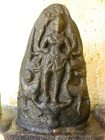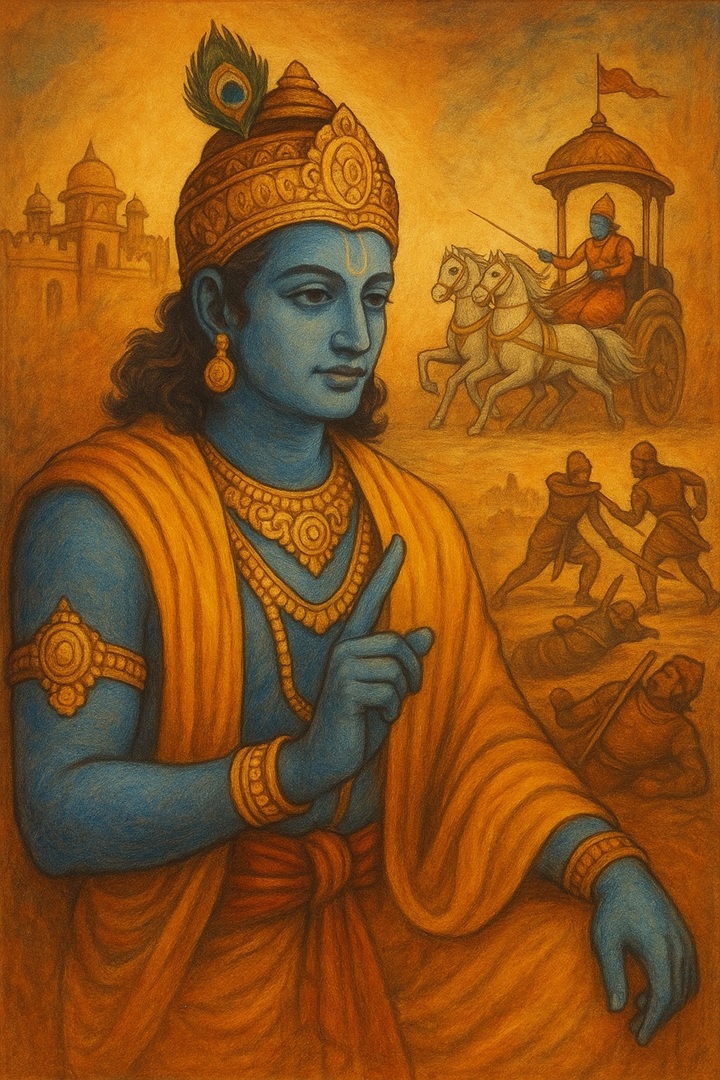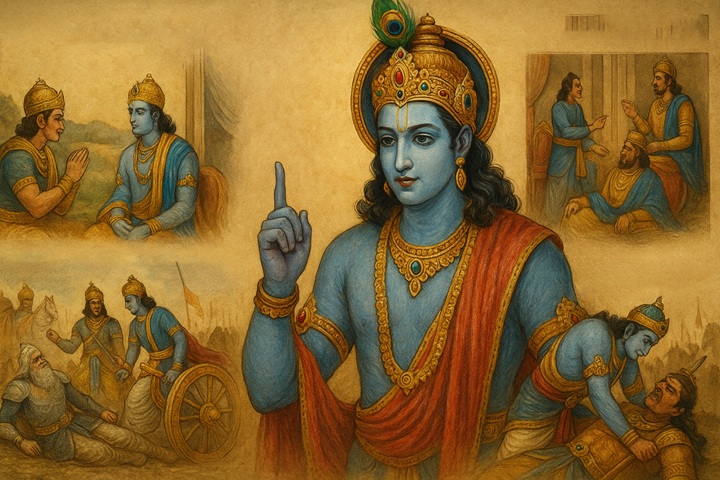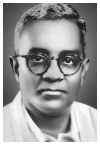 |
 |
 |
http://www.varalaaru.com A Monthly Web Magazine for South Asian History [187 Issues] [1839 Articles] |
 |
 |
 |
http://www.varalaaru.com A Monthly Web Magazine for South Asian History [187 Issues] [1839 Articles] |
|
Issue No. 186

இதழ் 186 [ அக்டோபர் 2025 ] 
இந்த இதழில்.. In this Issue.. 
|
Introduction The common images associated with Krishna when someone contemplates him are the divine flute player of Brindavan, the favorite of the Gopikas, or the philosopher presented in the Bhagavad Gita. Nevertheless, a further equally important facet exists beyond these devotional portraits, and that is Krishna's identity as a statesman, diplomat, and strategist. Besides presenting him as a godhead, the Mahabharata also portrays him as a master of political wisdom who advised the Pandavas during their fight for justice. By uniting pragmatic methods with a moral compass, his approach was crafted to secure the eventual dominance of Dharma, which signifies righteousness.  A Political Strategist and Diplomat As well as being a divine protector, Krishna was a pragmatic statesman, demonstrating a comprehensive grasp of the political climate during his lifetime. Although Dharma constituted his core guiding principle, he exercised considerable flexibility when applying it, tailoring his actions to the unique demands of each situation. Beyond offering guidance in military conflicts, as an advisor to the Pandavas, his contributions extended to providing counsel on matters of governance, alongside helping them recover and rebuild after hardships, including periods of exile. One of the best examples of his role as an alliance builder can be seen in the context of the marriage between his sister Subhadra and Arjuna. This gathering was far more than just a meeting of family members; it was a meticulously planned political maneuver, guaranteeing the continued unity of the Pandavas and Yadavas in matters of both military strength and political influence. Krishna's diplomacy is a clear indication of his ability to successfully balance idealism with realpolitik. While prioritizing justice, he was aware that in times of crisis, strategies, and potentially even subversive methods, were essential instruments to ensure righteousness. The Peace Mission Krishna's mission of peace to Hastinapura, which he undertook before the Kurukshetra war, is perhaps the most admired political act he ever performed. He traveled as an envoy of the Pandavas and tried to convince Duryodhana to avoid war, and he offered a remarkable compromise where the Pandavas would be satisfied with only five villages. It was not a sign of weakness, but a testament to the exceptional statesmanship that was displayed through this offer. Krishna's actions demonstrated a clear preference for peace, and he was willing to give up some measure of grandeur to prevent violence from occurring. Even though Duryodhana stubbornly refused the proposal, everyone realized that unchecked ambition can ultimately lead to a loss of rational thinking. This particular episode is often recalled by scholars as an example of how moral diplomacy can be successfully combined with practical negotiation, a precedent that continues to hold relevance within contemporary political thought. Battlefield Strategies Krishna's strategic brilliance was most evident when all attempts at peace had been exhausted and war was the only option. Even though he had made a promise not to use any weapons, it was his guidance that ultimately determined how the battle would unfold. • Krishna's suggestion to Arjuna to position Shikhandi in front of Bhishma, aware that Bhishma would never harm a woman, facilitated Bhishma's downfall. • The death of Drona was brought about by a shrewd maneuver that played on his mind. Krishna proposed the announcement that "Ashwatthama" was dead, even though it was the elephant who bore that name, not Drona's son, who had been killed. The uncertainty of the situation completely destroyed the preceptor's morale. • Krishna's unwavering dedication to Dharma was made apparent during Karna's Fall. With Karna's chariot wheel mired in the earth, Krishna encouraged Arjuna to capitalize on the opportunity, warning him that any reluctance would give strength to adharma. • The moment Krishna subtly gestured for Bhima to attack below the waist, Duryodhana, whose body was impenetrable everywhere else, experienced defeat. Although they were unconventional, the tactics employed fulfilled the larger purpose of safeguarding Dharma. Krishna showed that when confronted with merciless adversaries, upholding moral principles occasionally necessitated the use of unconventional methods. Protector of Dharma Krishna's actions, encompassing both diplomacy and military strategy, consistently showed that the fundamental goal of politics and war was the preservation of Dharma. His focus was not on the acquisition of authority, but instead on his goal of re-establishing societal harmony. His lessons emphasized that even though moral principles serve as the fundamental basis, the means of upholding and protecting such ideals lies in the realm of practical statecraft. At times, the strategies might have seemed difficult to accept, but their underlying objective was to prevent the triumph of wickedness. The Pandavas, although they were at a numerical disadvantage, were victorious due to Krishna’s leadership. By carrying out these actions, he established an enduring legacy, recognized not merely as God in human form but also as the most important political thinker of his time.  Conclusion The Mahabharata's depiction of Krishna's existence illustrates a unique combination of godliness and political leadership. He was: • a political strategist who built alliances and foresaw outcomes, • a diplomat who sought peace with humility, • a battlefield planner who designed decisive strategies, and • a protector of Dharma who blended morality with pragmatism. Krishna is viewed as more than just Arjuna's charioteer, but as an eternal strategist who, throughout the centuries, has been a source of inspiration for leaders, philosophers, and those seeking justice. |

சிறப்பிதழ்கள் Special Issues 

புகைப்படத் தொகுப்பு Photo Gallery 
|
| (C) 2004, varalaaru.com. All articles are copyrighted to respective authors. Unauthorized reproduction of any article, image or audio/video contents published here, without the prior approval of the authors or varalaaru.com are strictly prohibited. | ||